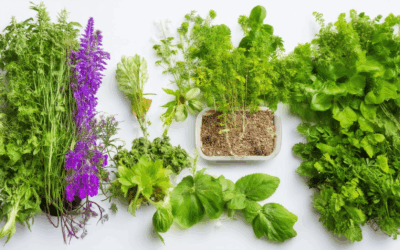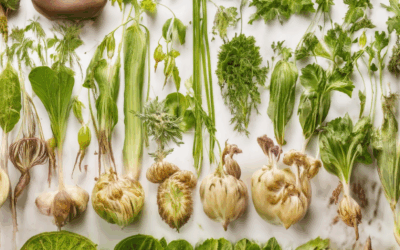As environmental awareness continues to grow, so does the demand for effective and sustainable solutions to common pest problems. Organic pest deterrents have emerged as a popular alternative to traditional chemical methods, offering a safer and more eco-friendly approach to managing unwanted intruders. Whether it’s pests in your garden, around your home, or even in your vegetable patch, finding a natural solution can be both practical and rewarding. In this article, we’ll explore the best organic pest deterrents, the scents that pests hate, and how you can create your own natural remedies to keep your space pest-free. From essential oils to DIY solutions, we’ll cover everything you need to know to effectively deter pests while protecting your environment. By choosing organic methods, you not only reduce your reliance on harmful chemicals but also contribute to a healthier planet for future generations.
Key Takeaways
– Discover effective organic scents that naturally repel pests, including lavender, peppermint, lemongrass, eucalyptus, rosemary, and clove.
– Cinnamon is a powerful natural deterrent for common pests like ants, spiders, and beetles, thanks to its cinnamaldehyde compound.
– Peppermint oil repels pests effectively for up to 24 hours when applied directly, with diluted versions lasting longer.
Best Natural Pest Repellent
When it comes to protecting your garden or home from pests, natural alternatives are becoming increasingly popular due to their effectiveness and environmental safety. Here are some of the most effective natural pest repellents and methods:
1. Hot Pepper Solution
Mixing hot peppers with water can create a natural pesticide. The capsaicin in chili peppers deters many common pests, including aphids, spiders, and mice. Simply dilute a few drops of hot pepper extract in water and spray onto affected areas.
2. Neem Oil
Neem oil is a versatile natural remedy known for its ability to repel pests like aphids, spider mites, and whiteflies. Mix a few tablespoons of cold-pressed neem oil with water and apply it to plants as a spray. Neem oil works best when applied every 7-10 days.
3. Garlic and Onion Spray
Garlic and onion extracts are another effective natural pest deterrent. Combine chopped garlic and onions, soak them in water for a day, then strain and spray the mixture on plants. This method is particularly useful against fungal infections and certain insect pests.
4. Diatomaceous Earth
Diatomaceous earth is a natural powder made from fossilized algae. It acts as a physical barrier against pests like ants, fleas, and beetles. Sprinkle it around entry points or directly on plants to create a non-toxic barrier.
5. Citronella
Citronella is a natural insect repellent derived from the lemon eucalyptus plant. It’s commonly used in sprays and candles to deter mosquitoes and other flying insects. Apply citronella-based products outdoors to keep pests away during gatherings or picnics.
6. Vinegar Solution
Vinegar mixed with water can be used as a simple natural pest repellent. The acidity of vinegar disrupts the surface tension of water, creating a barrier that pests find difficult to cross. Spray it on surfaces or directly on plants to repel unwanted visitors.
7. Physical Barriers
Install physical barriers like mesh screens or fine netting to prevent pests from entering your garden or home. This method is particularly effective for keeping out larger animals like deer or rabbits.
8. Companion Planting
Planting companion crops can help repel pests naturally. For example, marigolds deter aphids, basil repels flies, and nasturtiums attract pests like aphids and cabbage worms. Incorporate these plants into your garden layout to create a balanced ecosystem.
9. Biological Control
Introduce natural predators or parasites to control pest populations. ladybugs are a great example, as they feed on aphids and other soft-bodied insects. Encourage beneficial insects by providing habitats like flowers and shrubs.
10. Cultural Practices
Practice crop rotation and companion planting to reduce the likelihood of pests. Overcrowding plants can stress them and make them more vulnerable to pests. Maintain healthy soil and regularly inspect plants to catch issues early.
For more detailed guides on natural pest control methods, check out our Gardening Guides section. We provide in-depth resources on sustainable gardening techniques and organic pest management.
Does Organic Pest Control Really Work?
Yes, organic pest control methods are highly effective and often surpass traditional chemical treatments in controlling pests while maintaining environmental safety. Here’s why organic pest control works:
- Natural Solutions : Organic methods utilize natural substances like compost, neem oil, and insecticidal soap, which disrupt pest life cycles without harming beneficial organisms or humans.
- Long-Term Benefits : Unlike synthetic pesticides, organic controls don’t leave harmful residues, reducing the risk of pest resistance and ensuring a healthier garden ecosystem.
- Comprehensive Approach : By combining biological, cultural, and chemical organic methods, you can create an integrated pest management system that effectively targets pests while supporting biodiversity.
- Reduced Chemical Exposure : Organic pest control minimizes exposure to harmful chemicals, making it safer for people, pets, and wildlife.
- Sustainability : Organic practices align with eco-friendly lifestyles and contribute to soil health and long-term fertility, ensuring productive gardens for years to come.
For instance, using companion planting techniques or introducing beneficial insects can significantly reduce pest populations. Additionally, organic fertilizers enrich the soil, promoting robust plant growth and natural pest resistance.
Learn more about effective organic gardening techniques by exploring our comprehensive gardening guides and discover how to implement these methods in your own space.
What Do Organic Farms Use to Keep Bugs Away?
Organic farms employ a variety of natural and sustainable methods to repel pests and maintain plant health. Here are some common approaches they use:
- Neem Oil Spray : One of the most popular natural insecticides, neem oil is derived from the neem tree. It is effective against many common pests and can be applied as a spray by mixing one cup of neem oil with one tablespoon of mild soap and two cups of water. This solution is safe for plants and helps protect against fungal infections as well.
- Garlic Spray : Garlic has natural pesticidal properties. Farmers often create a garlic solution by crushing several cloves of garlic, soaking them in water for 24 hours, straining the mixture, and then applying it to plants. This method is particularly effective against aphids and mites.
- Peppermint Oil : Peppermint is known for its strong scent, which repels many pests. A simple solution involves diluting a few drops of peppermint essential oil in water and applying it to affected areas. This method is especially useful for deterring ants and spiders.
- Diatomaceous Earth : This fine powder is a natural deterrent for soft-bodied insects like aphids and slugs. Applied as a dust around plants and garden beds, it works by physically abrading the insects, leading to dehydration and death.
- Companion Planting : Organic farmers often intersperse plants like marigolds, nasturtiums, and basil among their crops. These plants act as natural repellents, attracting pests away from the main crop and improving the overall garden ecosystem.
These methods are part of integrated pest management (IPM) practices, which focus on maintaining balance and biodiversity in the garden. By using these organic alternatives, farms reduce reliance on synthetic pesticides, promote soil health, and support sustainable agriculture.
For more information on natural pest control methods and sustainable farming practices, visit our sustainable farming resources .
What Scent Do All Pests Hate?
There are several scents that pests commonly dislike, making them effective natural deterrents. These scents not only repel insects but also contribute to a pleasant environment.
- Lavender: Known for its calming fragrance, lavender is highly disliked by many pests, including mosquitoes and flies.
- Peppermint: With its sharp, fresh aroma, peppermint repels a variety of pests such as ants and beetles.
- Lemongrass: This citrusy scent is hated by pests like moths and spiders, making it ideal for protecting stored goods.
- Eucalyptus: The strong, mentholated smell of eucalyptus deters pests like wasps and aphids.
- Rosemary: Often used in gardens, rosemary’s scent wards off pests like deer and rabbits.
- Clove: Its intense fragrance is disliked by pests such as mice and rats.
To maximize effectiveness, diffuse these scents or use them in spray forms around your home or garden. For more tips on using these natural repellents, explore our natural pest control guide .
Does Cinnamon Repel Bugs?
Cinnamon, derived from the cassia tree, contains natural compounds like cinnamaldehyde that are known to repel various pests. Its effectiveness is supported by studies showing it can deter common household insects and arachnids.
- Common Pests Repelled: Cinnamon is effective against ants, spiders, beetles, and other crawling insects due to its aromatic properties.
- How It Works: The compound cinnamaldehyde in cinnamon disrupts insects’ nervous systems, making it difficult for them to survive in treated areas.
- Application Tips: Sprinkle cinnamon powder along windowsills, doorways, and around potential entry points to create a natural barrier. For outdoor use, mix cinnamon with other natural repellents for enhanced effectiveness.
- Caution: While cinnamon is generally safe, avoid overuse near sensitive areas like eyes and skin, as it can cause irritation.
Studies have shown that cinnamon’s repellent effects vary depending on the species and concentration, but it remains a popular natural alternative to chemical pesticides.
For more information on natural pest control methods, visit our natural pest control guide .
How Long Does Peppermint Oil Repel Bugs?
The duration peppermint oil repels bugs depends on several factors:
- Dilution and Concentration: Diluted peppermint oil may last longer due to its lower concentration, allowing it to remain effective over a longer period.
- Application Method: When applied directly to surfaces, peppermint oil can protect for about 24 hours before needing reapplication. Using it in a diffuser can provide continuous protection for several hours until the scent fades.
- Bug Type: Effectiveness varies by insect. Ants may be repelled for a few hours, while mosquitoes might require a stronger solution or combination with other repellents.
- Environmental Conditions: Temperature and humidity levels impact oil longevity. Warmer environments reduce effectiveness, while cooler temps enhance it.
For optimal results, reapply peppermint oil after heavy rain or sweating and consider combining it with other repellents for added efficacy.








0 Comments